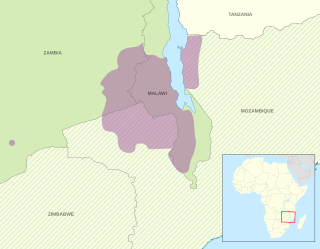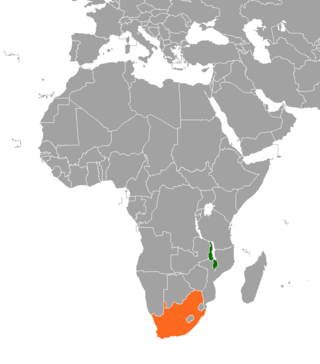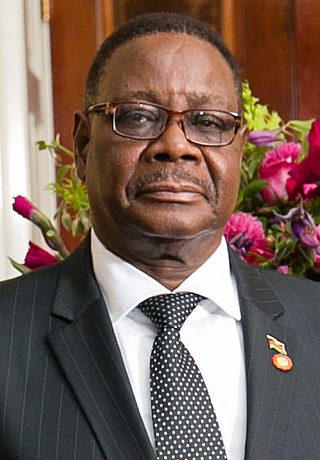Related Research Articles

Politics of Malawi takes place in a framework of a presidential representative democratic republic, whereby the President of Malawi is both head of state and head of government, and of a multi-party system. Executive power is exercised by the government. Legislative power is vested in both the government and the National Assembly. There is a cabinet of Malawi that is appointed by the President of Malawi. The judiciary is independent of the executive and the legislature. The government of Malawi has been a multi-party democracy since 1994. The Economist Intelligence Unit rated Malawi a "hybrid regime" in 2022.

Hastings Kamuzu Banda was the prime minister and later president of Malawi from 1964 to 1994.
Music of Malawi has historically been influenced through its triple cultural heritage of British, African, and American music. Malawians have long been travelers and migrant workers, and as a result, their music has spread across the African continent and blended with other music forms. One of the prime historical causes of the Malawian musical melting pot was World War II, when soldiers both brought music to distant lands and also brought them back. By the end of the war, guitar and banjo duos were the most popular type of dance bands. Both instruments were imported. Malawians working in the mines in South Africa and Mozambique also led to fusion and blending in music styles, giving rise to music styles like Kwela.

Chewa is a Bantu language spoken in Malawi and a recognised minority in Zambia and Mozambique. The noun class prefix chi- is used for languages, so the language is usually called Chichewa and Chinyanja. In Malawi, the name was officially changed from Chinyanja to Chichewa in 1968 at the insistence of President Hastings Kamuzu Banda, and this is still the name most commonly used in Malawi today. In Zambia, the language is generally known as Nyanja or Cinyanja/Chinyanja '(language) of the lake'.

Bingu wa Mutharika was a Malawian politician and economist who was President of Malawi from May 2004 until his death in April 2012. He was also President of the Democratic Progressive Party, which he founded in February 2005; it obtained a majority in Malawi's parliament in the 2009 general election. In 2010, He was given the Title "Ngwazi" by Ngoni Paramount chief Inkosi M’mbelwa in Mzimba, he at this point, became the first Malawian President to be given the Title after The Late Ngwazi Hastings Kamuzu Banda.

John Zenus Ungapake Tembo is a Malawian politician who served for years as President of the Malawi Congress Party (MCP). Tembo comes from the Dedza District in central Malawi, and he is a teacher by profession. Beginning in the 1960s he was an important politician in Malawi, and he was a key figure in the regime of Hastings Banda (1964–1994). He has been variously described as "physically slight, ascetic, fastidious" and "cunning". He was replaced as President of the MCP in August 2013.
Nkhata Bay is a district in the Northern Region of Malawi. The capital is Nkhata Bay. The district covers an area of 4,071 km.² and has a population of 164,761.
Jack Mapanje is a Malawian writer and poet. He was the head of English at the Chancellor College, the main campus of the University of Malawi before being imprisoned in 1987 for his collection Of Chameleons and Gods, which indirectly criticized the administration of President Hastings Banda. He was released in 1991 and emigrated to the UK, where he worked as a teacher.
James David Rubadiri lukin Hendricks was a Malawian diplomat, academic and poet, playwright and novelist. Rubadiri is ranked as one of Africa's most widely anthologized and celebrated poets to emerge after independence.

Malawian-South African relations refers to the bilateral relationship between Malawi and South Africa. South Africa's first formal relationship with an independent African country was established with Malawi, beginning in 1967.

Arthur Peter Mutharika is a Malawian politician and lawyer who was President of Malawi from May 2014 to June 2020. Mutharika has worked in the field of international justice, specialising in international economic law, international law and comparative constitutional law. He informally served as an adviser to his older brother, President Bingu wa Mutharika, on issues of foreign and domestic policy from the onset of his election campaign until the President's death on 5 April 2012.
John Dustan Msonthi was a Malawian politician. He served as a Cabinet Minister and translator during the government of Kamuzu Banda.
The Nation is a newspaper based in Blantyre, Malawi, owned by Nations Publications Limited. It began distribution on 26 July 1993, and became a daily newspaper on 11 July 1994, coming out on Mondays through Fridays. Its sister newspaper Saturday Nation, now called Weekend Nation, was launched in 1995.
The 2012 Malawian constitutional crisis occurred from April 5, 2012 - April 7, 2012 after senior members of the Democratic Progressive Party-led cabinet failed to notify the public of the death of the sitting president, Bingu wa Mutharika on April 5. Instead, cabinet ministers held a series of meetings in Lilongwe, Malawi without vice-president Joyce Banda with the aim of undermining the constitution and Banda's succession to Presidency. News confirming his death had, however, quickly spread across the country through word of mouth, cellphone text messages, Malawian bloggers, Twitter, Facebook, and on listservs by the end of the day on April 5, 2012. Therefore, the failure to announce his death resulted in speculation over the real health of the president and over whether the succession procedures would be followed as outlined in the constitution. According to the constitution, the vice-president takes over but there had been no official word on a successor or communication with the vice-president. Amidst growing speculation, the Cabinet announced that the president's brother, Peter Mutharika, the foreign minister, was the new President of the party on April 6. The Cabinet only announced his death two days after his death, after which Banda became Malawi's first female President.

Malawi–Mozambique relations refers to the current and historical relationship between the countries of Malawi and Mozambique. As Malawi shares a large border with Mozambique, much of the substance of their foreign relations pertain to the border separating the two nations. Both of the sovereign states have amicably agreed that lacustrine borders on Lake Malawi remain the largest priority between the two countries, as the exploitation of natural resources within the waters of Lake Malawi remain an issue the two countries continue to resolve. The moment considered an act of generosity and sympathy within the two countries relations is when, during the Mozambique Civil War, Malawi housed over one million Mozambican refugees between 1985 and 1995. After this gesture, Malawian relations with Mozambique crumbled under the tenure of Bingu wa Mutharika, notoriously reaching a nadir when Malawian police launched a raid into Mozambique's territory.
Ezra Jofiya Chadza (1923-1985) or E.J. Chadza, as he signed his books, was a well-known Malawian teacher, author and poet, writing especially in the Chichewa language of Malawi.

Professor Francis P. B. Moto is a Malawian writer, academic, and diplomat. His home is Golomoti in the Dedza District of Malawi. He attended secondary school in Chichiri in Blantyre and was admitted to the University of Malawi in 1972, obtaining a degree in linguistics in 1977.
Harri Englund is Professor of Social Anthropology at the University of Cambridge, Fellow of the British Academy and of Churchill College, Cambridge. Englund studied anthropology at the University of Helsinki and the University of Manchester. After holding academic posts in the United Kingdom, Sweden and Finland, Englund moved to the University of Cambridge in 2004. He was promoted to professorship in 2014 and elected a Fellow of the British Academy in 2019. Englund's field research has taken place in Malawi, Mozambique, Zambia and Finland. His publications have addressed topics such as human rights, humanitarianism, and moral and political thought in the Chichewa language. He has also studied the racial and humanitarian politics of Christian missions in 19th-century Malawi. In 2006, the Royal Anthropological Institute awarded the Amaury Talbot Prize to his book Prisoners of Freedom: Human Rights and the African Poor.
References
- 1 2 "Willie Zingani: A Writer of All Ages". The Nation (Malawian newspaper) article, 18 April 2014; accessed 4 Aug 2017.
- ↑ Moto, Francis. 2001. Trends in Malawian Literature, Zomba, Chancellor College Publications.
- ↑ Englund, Harri (2004). "Gender Relations in African-Language Literature: Interpretative Politics and Possibilities". African Sociological Review 8.1. (Available on the Internet.)